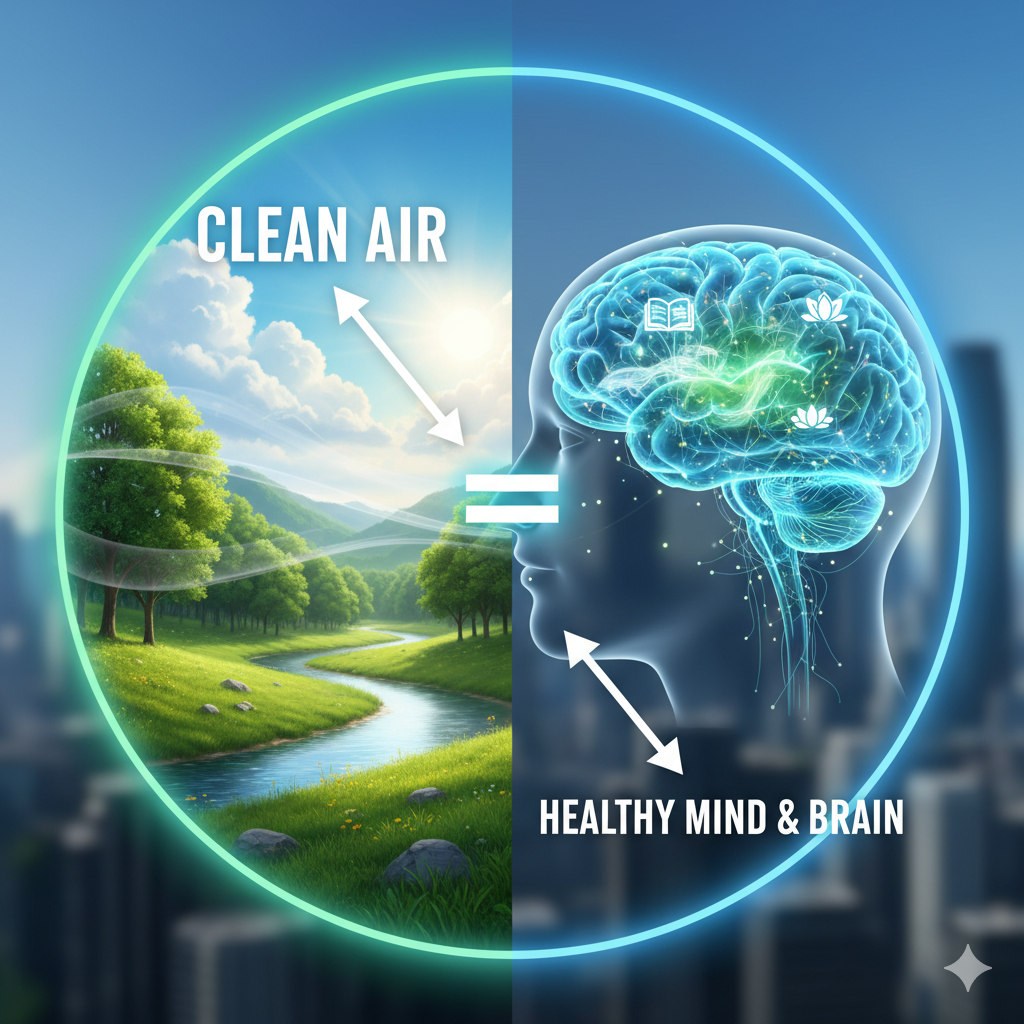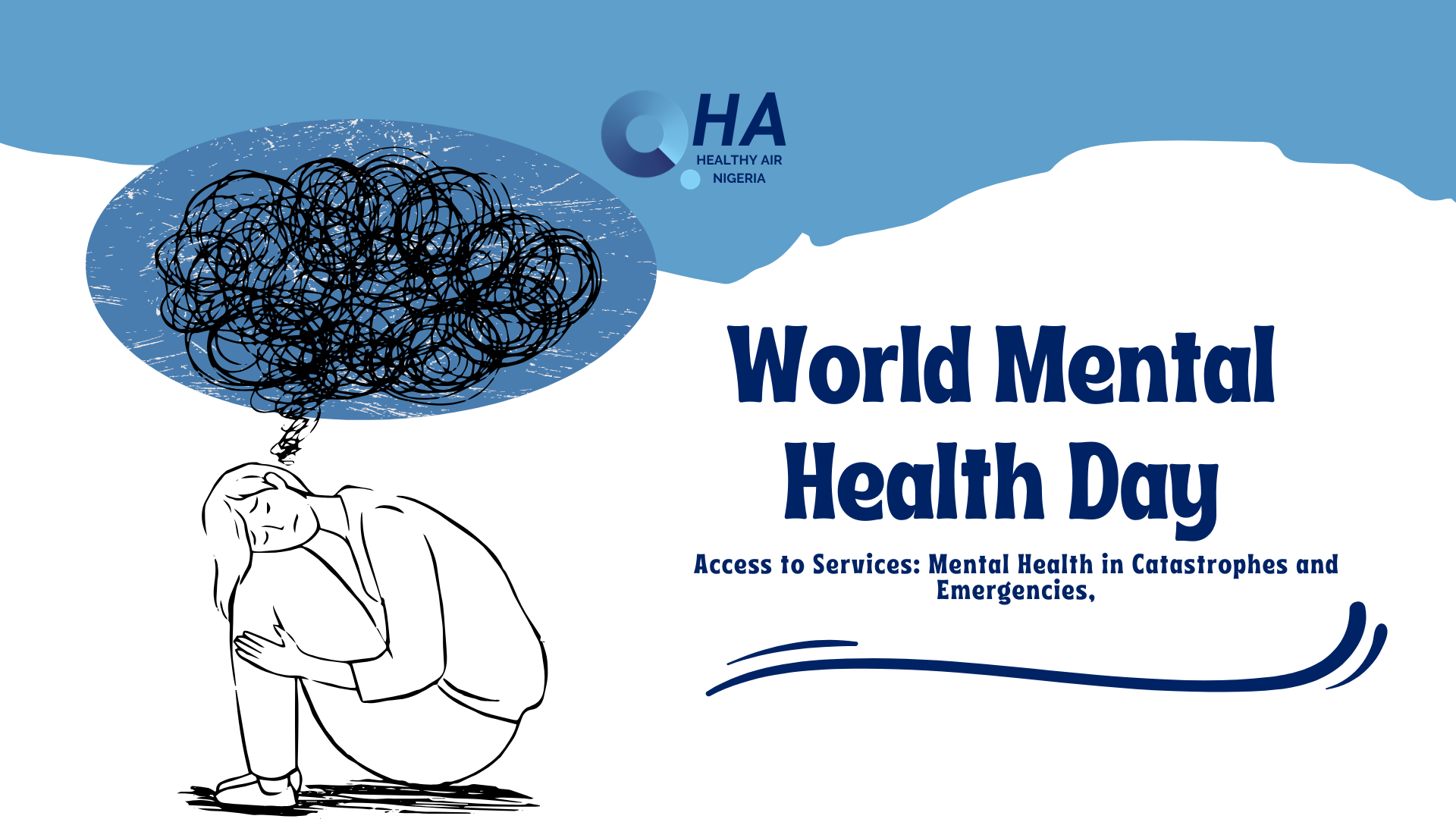Every breath you take can shape how you feel, think, and sleep.
Yet, we often forget that the same air keeping us alive can also silently drain our peace of mind.
Recent research following over 390,000 adults for more than 10 years revealed something eye-opening: long-term exposure to polluted air, especially fine particles (PM2.5) and Nitrogen dioxide (NO₂), significantly increases the risk of depression, anxiety, dementia, and poor sleep.
Even at pollution levels below permissible limits, scientists found a troubling pattern of poor air quality effects on mental health:
- Clouded thinking
- Restless nights
- Low mood
- Emotional fatigue

Who’s Vulnerable?
Every living human is at risk. However, children and senior citizens are even more vulnerable. Studies show that polluted air can slow brain development, affect school performance, and trigger emotional instability, issues that can linger for life. For older citizens, their weakening immune increases the risk of dementia, anxiety disorders, and depression.
Here’s the good news:
You can take back control of your mental health starting with your indoor air.
Over 90% of our time is spent indoors; at home, in offices, classrooms, or care facilities, places where we should feel safe. In reality, indoor air pollution is 5-7 times worse than outdoor air. That’s why Healthy Air Nigeria is raising awareness this World Mental Health Day about the link between clean air and emotional well-being.
The Link Between Clean Air and Emotional Well-Being.
This year’s World Mental Health Day themed “Access to Services: Mental Health in Catastrophes and Emergencies,” reminds us that in every crisis; whether environmental, social, or personal, mental health must remain a priority.
Yet, one often overlooked factor that shapes how we cope, heal, and recover is the quality of the air we breathe.
During emergencies such as floods, wildfires, or fire outbreaks, air quality often deteriorates, increasing exposure to fine particles, mould spores, and other toxins. These pollutants do more than affect physical health. They silently impact the brain and emotional stability of those affected, intensifying symptoms of stress, anxiety, depression, and sleep disturbance.
Scientific studies have shown that long-term exposure to poor air quality disrupts the brain’s chemical balance, reduces oxygen flow, and triggers inflammation linked to cognitive decline and mood disorders.
Conversely, clean, oxygen-rich air supports calmness, mental clarity, and emotional resilience, qualities essential for coping effectively in times of crisis.
For individuals already managing mental health conditions such as depression, insomnia, dementia, or schizophrenia, exposure to polluted indoor air can worsen symptoms, strain recovery, and heighten emotional distress.
That’s why ensuring access to clean, healthy air especially in homes, hospitals, schools, and care facilities is a critical yet underappreciated part of mental health support during emergencies.

Purifying Your Indoor Environments with Healthy Air
The Healthy Air DNO Catalyst Purifier plays a vital role in this effort. By breaking down airborne toxins, bacteria, and volatile organic compounds to release pure, oxygen-rich air, it helps maintain safe, breathable indoor environments, supporting both physical and emotional well-being even in the most challenging circumstances.
In protecting our air, we protect our minds.
Because access to clean air is not just a physical need; It’s a cornerstone of mental health resilience in a constantly changing world.
Because every calm thought begins with a clean breath.
This World Mental Health Day, pause and take one mindful step: breathe clean, live calm.
If you or someone you love is struggling, please reach out for help. You’re not alone.
Send us a mail or direct message on any of our social media accounts
Let’s make mental health a shared air we care about.
Sources
- National Institutes of Health (PMC, 2024) – Ambient air pollution and depression among older adults in Ireland
https://pmc.ncbi.nlm.nih.gov/articles/PMC11163701/?utm
- JAMA Psychiatry (2023) – Long-term exposure to multiple air pollutants and the risk of depression and anxiety disorders: A UK Biobank cohort study
https://jamanetwork.com/journals/jamapsychiatry/fullarticle/2801116?utm
- Journal of Behavioral and Applied Psychology (2024) – Air pollution and mental health: A review of evidence linking PM₂.₅ exposure to depression
https://li01.tci-thaijo.org/index.php/JBAP/article/view/259768?utm
#WorldMentalHealthDay #HealthyAirNigeria #BreatheClean #MentalHealthAwareness #CleanAirForAll


